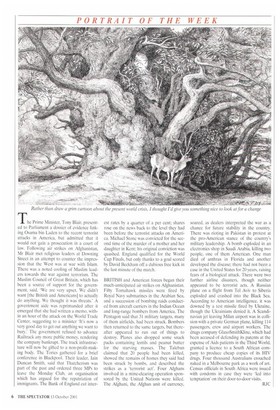T he Prime Minister, Tony Blair, presented to Parliament a dossier
of evidence linking Osama bin Laden to the recent terrorist attacks in America, but admitted that it would not gain a prosecution in a court of law. Following air strikes on Afghanistan, Mr Blair met religious leaders at Downing Street in an attempt to counter the impression that the West was at war with Islam. There was a noted cooling of Muslim leaders towards the war against terrorism. The Muslim Council of Great Britain, which has been a source of support for the government, said, We are very upset. We didn't want [the British and Americans] to actually do anything. We thought it was threats.' A government aide was reprimanded after it emerged that she had written a memo, within an hour of the attack on the World Trade Center, suggesting to a minister 'ifs now a very good day to get out anything we want to bury. The government refused to advance Railtrack any more public money, rendering the company bankrupt. The track infrastructure will now be gifted to a non-profit-making body. The Tories gathered for a brief conference in Blackpool. Their leader, lain Duncan Smith, said that Thatcherism was part of the past and ordered three MPs to leave the Monday Club, an organisation which has argued for the repatriation of immigrants. The Bank of England cut inter est rates by a quarter of a per cent; shares rose on the news back to the level they had been before the terrorist attacks on America. Michael Stone was convicted for the second time of the murder of a mother and her daughter in Kent: his original conviction was quashed. England qualified for the World Cup Finals, but only thanks to a goal scored by David Beckham off a dubious free kick in the last minute of the match.
BRITISH and American forces began their much-anticipated air strikes on Afghanistan. Fifty Tomahawk missiles were fired by Royal Navy submarines in the Arabian Sea, and a succession of bombing raids conducted from aircraft carriers in the Indian Ocean and long-range bombers from America. The Pentagon said that 31 military targets, many of them airfields, had been struck. Bombers then returned to the same targets, but thereafter appeared to run out of things to destroy. Planes also dropped some snack packs containing lentils and peanut butter for the starving masses. The Taleban claimed that 20 people had been killed, showed the remains of homes they said had been struck by bombs, and described the strikes as a 'terrorist act'. Four Afghans involved in a mine-clearing operation sponsored by the United Nations were killed. The Afghani, the Afghan unit of currency, soared, as dealers interpreted the war as a chance for future stability in the country. There was rioting in Pakistan in protest at the pro-American stance of the country's military leadership. A bomb exploded in an electronics shop in Saudi Arabia, killing two people, one of them American. One man died of anthrax in Florida and another developed the disease; there had not been a case in the United States for 20 years, raising fears of a biological attack. There were two further airline disasters, though neither appeared to be terrorist acts. A Russian plane on a flight from Tel Aviv to Siberia exploded and crashed into the Black Sea. According to American intelligence, it was downed by a test missile fired by Ukraine, though the Ukrainians denied it. A Scandinavian jet leaving Milan airport was in collision with a private German plane, killing 114 passengers, crew and airport workers. The drugs company GlaxoSmithKline, which had been accused of defending its patents at the expense of Aids patients in the Third World, granted a licence to a South African company to produce cheap copies of its HIV drugs. Four thousand Australians crouched naked in a Melbourne park as a work of art. Census officials in South Africa were issued with condoms in case they were led into temptation' on their door-to-door visits.


























































































 Previous page
Previous page